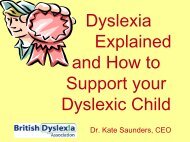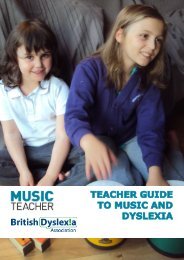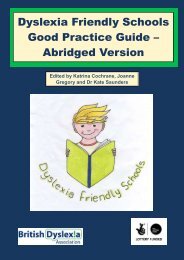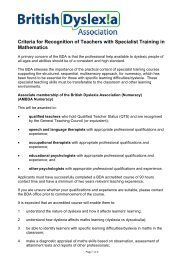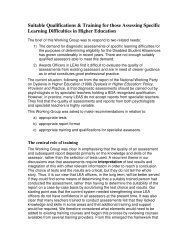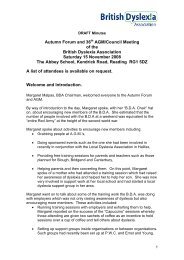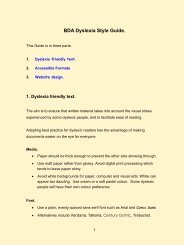Intervention for Dyslexia - The British Dyslexia Association
Intervention for Dyslexia - The British Dyslexia Association
Intervention for Dyslexia - The British Dyslexia Association
Create successful ePaper yourself
Turn your PDF publications into a flip-book with our unique Google optimized e-Paper software.
success of the programme appears to be inversely related to the severity of the reading<br />
problem.” (Reynolds and Wheldall, 2007, pp.218-9).<br />
In 2002, 31 eminent reading researchers in the USA wrote an open letter to members of<br />
the US Congress detailing the following concerns regarding the adoption of Reading<br />
Recovery in US schools (Baker et al., 2002): 1) Lack of good evidence <strong>for</strong> the success of<br />
Reading Recovery with its targeted population, i.e. the lowest per<strong>for</strong>ming pupils. <strong>The</strong><br />
letter highlighted the exclusion of 25%–40% of the poorest per<strong>for</strong>ming students from<br />
data analyses carried out in non-independent evaluations; 2) Reading Recovery was not<br />
a cost-effective solution because of the high cost of training and the insistence on oneto-one<br />
tuition when, it was argued, small group tuition has been shown to be just as<br />
effective; 3) <strong>The</strong> excessive costs of Reading Recovery could make it more difficult <strong>for</strong><br />
schools to provide help <strong>for</strong> all children who were in need, particularly those children<br />
older than the range targeted by Reading Recovery; 4) Reading Recovery efficacy<br />
studies did not use standard assessment measures, but instead used their own nonstandard<br />
measures, which were also used to determine which students were to be<br />
included in the sample, thereby inflating outcomes; 5) Reading Recovery had been<br />
resistant to integrating the findings of independent, scientific research, particularly<br />
concerning the importance of explicit teaching of phonics; although Reading Recovery<br />
did include some phonics within its methods, this instruction was not regarded by the<br />
authors of this letter as being sufficiently explicit.<br />
It should be emphasised that these concerns applied to Reading Recovery programmes<br />
in the USA at that time. <strong>The</strong>y are mentioned here not only because of the unusual<br />
prominence of this particular letter to Congress, but also because Reading Recovery<br />
here is rooted in the approach as delivered internationally, and it is necessary to<br />
consider whether these criticisms also apply to Reading Recovery as currently provided<br />
in England (both within ECaR and more generally).<br />
<strong>The</strong> analysis of studies on Reading Recovery in the rest of this chapter will follow a<br />
similar sequence to that adopted <strong>for</strong> phonologically-based studies earlier in this report,<br />
that is, the strongest studies (randomised controlled trials and quasi-experimental<br />
studies) from the rest of the world are analysed first, followed by studies conducted in<br />
Britain. <strong>The</strong> reason <strong>for</strong> this separation is, again, that no relevant RCTs have been<br />
conducted in Britain. (Within the study carried out in London and Surrey in the 1990s<br />
there was an RCT, but it compared children receiving and not receiving the alternative<br />
intervention, Phonological Training, and did not involve those receiving Reading<br />
Recovery.)<br />
5.2.2 RCT and quasi-experimental studies of Reading Recovery<br />
A review by the What Works Clearinghouse (2007a) in the USA identified 78 studies on<br />
Reading Recovery, of which just four were RCTs which met their evidence standards in<br />
full, and one (the Iversen and Tunmer, 1993 study referred to above) was a quasiexperimental<br />
study which met the evidence standards with reservations. <strong>The</strong> Hatcher et<br />
al. (1994) study is not listed among the studies that did not meet the evidence<br />
standards, presumably because its Reading-only condition was not explicitly called<br />
Reading Recovery. All five included studies were conducted in the USA, at dates<br />
between the mid 1980s and the start of this decade (thus three of the studies were<br />
conducted be<strong>for</strong>e the addition of phonics to the programme).<br />
<strong>Intervention</strong> <strong>for</strong> <strong>Dyslexia</strong> 101



